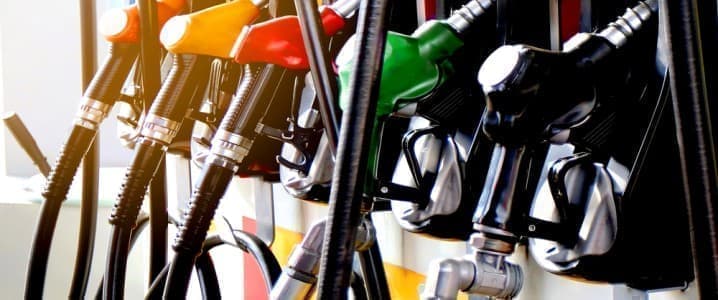Earlier this year, as oil prices recovered from their pandemic lows and oil-producing companies miraculously stuck to their pledged production cuts, headlines were flooded with semi-alarmist speculation about painfully high gas prices coming down the pike. Now, high gas prices are back in the news, but this time the oil companies and production curbs are not to blame -- the culprit now is retail fuel station chains, which are accused of colluding to artificially inflate gas prices at the pumps.
Back in March Oilprice reported that “U.S. Consumers Will Pay The Bill For Higher Crude Prices,” noting that oil companies were breaking with their normal pattern of cutting production when oil prices deflate and immediately returning to a “drill, baby, drill!” attitude the millisecond that the market shows signs of recovery. This time was different. After the novel coronavirus pushed oil prices to punishing new lows, with the West Texas Intermediate crude benchmark reaching a historic nadir of nearly $40 below zero per barrel in April 2020, oil producers showed uncharacteristic restraint by keeping production cuts in place even after oil prices recovered.
“Gas prices have risen about 35 cents a gallon on average over the last month, according to the AAA motor club, and could reach $4 a gallon in some states by summer,” the New York Times reported at the time. “While overall inflation remains subdued, some economists are worried that prices, especially for fuel, could rise faster this year than they have in some time. That would hurt working-class families more because they tend to drive older, less efficient vehicles and spend a higher share of their income on fuel.”
Now, consumers are hurting once again, but this time The Federal Trade Commission (FTC) plans to do something about it.
Ballooning inflation on goods including gas has reflected negatively on the Biden administration, and cracking down on rising gas prices has quickly become a priority for the federal government. The FTC is now looking into whether gas station franchises are colluding to drive up prices at the pump, and to determine how they can go about cracking down on the industry’s rampant and quasi-legal (if not outright illegal) mergers and acquisitions. Proposed crackdown strategies include instating ‘prior approval’ requirements to mitigate illegal oil and gas mergers.
“Over the last few decades, retail fuel station chains have repeatedly proposed illegal mergers, suggesting that the agency’s approach has not deterred firms from proposing anticompetitive transactions in the first place,” FTC Chair Lina Khan said in a recent statement. “We will need to determine whether the power imbalance favoring large national chains allows them to force their franchisees to sell gasoline at higher prices, benefitting the chain at the expense of the franchisee’s convenience store operations,” she added.
Related: Is It Possible To Eliminate Greenwashing?
This crackdown comes on the heels of “significant consolidation” in the retail fuel industry in recent years, but has been catalyzed and politicized by the bad optics of high post-pandemic inflation rates on the Biden Administration, as well as fresh concern over gas shortages and price hikes as Hurricane Ida swept through Louisiana, shutting down 75 percent of the state’s oil capacity. Reports have warned that extensive damage caused by the initially category 4 hurricane could slow down the entire post-pandemic recovery of the oil and gas sector, causing fresh wringing of hands about rising oil and gas prices in the near future.
Concern about high gas prices is well-founded. Back in July, the New York Times reported that “the rapid run-up [in fuel prices] comes at a delicate moment for the U.S. economy, which was already experiencing the fastest inflation in years amid resurgent consumer activity and supply-chain bottlenecks. And it could cause a political headache for President Biden as he tries to convince the public that his policies are helping the country regain its footing.” That prediction turned out to be prophetic, and high oil and gas prices could indeed derail the country’s entire economic recovery, and it will be U.S. consumers who pay the price.
If the FTC is successful in its crackdown, it would have major implications for consumer protection and antitrust enforcement that could set a positive precedent for exploitative practices going forward in a sector that is plagued by shadowy business deals. Or it could just be more ineffective political blunderbuss.
By Haley Zaremba for Oilprice.com
More Top Reads From Oilprice.com:
- China Is Hoarding Crude Again, And That’s Great News For Oil Prices
- Natural Gas Prices Are Soaring Despite U.S. Production Records
- WTI Oil Jumps Above $70 On Bullish U.S. Demand Data



















That is why all realize on or about $70 us dollars a barrel for oil is resistance with a Big Short on big time going into Fall starting Tuesday.
Wholesale abandonment of Afghanistan makes the situation even worse as equal to obvious moar woar, higher taxes, worse to non existent Government, even worse than that and hence my price target on oil downgraded from $1.00 us dollar a barrel to nil going on for the past Month or so and remaining so for the rest of the Year.
Natural gas should be even worse as it is far more sensitive to such a massive recession than oil is.
As for gasoline it's back to being a (very valuable) waste product.
Why are gasoline prices so high is because "very valuable waste product."